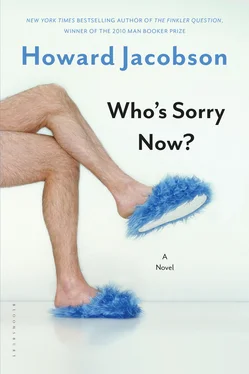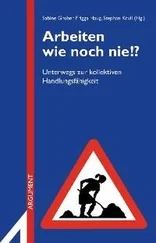He wasn’t going anywhere else, that he was sure about. There was no savour in the thought of Ooshi or Bernadette. And he was too low — low in spirits, but more importantly, too ethically low in his own estimation — to have any zest for making new ground. He couldn’t imagine himself polished up and ready to go. He had no shine. He had no caps in his pistol. Back was the place for him. Back made sense.
But there was a big black buzzing fly of a question in this ointment — had Charlie, out of the same mix of oafishness and unscrupulousness, told Hazel what he’d told Chas? Never trust a man who sees himself as a good husband: if Kreitman didn’t know that before, he knew it now. Even Charlie, though, must have seen that telling the one was not the same as telling the other. It was one thing Charlie ingratiating himself back into the favours of his wife at Kreitman’s expense. All’s fair in love and war. And any insult to Chas implicit in the revelation of Kreitman’s manipulative role was nicely offset by Charlie’s being able to show that his defection was never really of his own doing. He pushed me, Chassyboots. You lose one, you win one back; and the one Chas won back was the one she wanted anyway. But for Charlie to have left Hazel feeling she’d been bartered, dangled as a bit of bait by her husband and snatched at by Charlie in a fit of drunken not to say desperate bravado — and for Charlie then to have left her! — that surely was something else. That surely was an unthinkable callousness.
But did Charlie know that? Buzz, buzz, sang the big black fly. Kreitman put nothing past a good husband.
Kreitman listened to the silence coming from Kennington, interpreting it now this way, now that. You can tell when a silence is going to break, what Kreitman couldn’t tell was how. At last, he found a message from Hazel on his answering machine. He played it back several times with his heart in his mouth. Well? Had he or hadn’t he? Hazel’s voice was dark and cold, as remote as ever, and punitive — there was something he needed to come round and see with his own eyes straight away, meaning there was some misfortune he was going to have to bear the blame for. But as far as he could make out there was no reference to any new or specific misdemeanour on his part, just all the old ones.
‘Go upstairs,’ she told him, when he arrived. ‘Go upstairs and see your handiwork.’
He had put his arms out to her, more like an old friend than an old husband. ‘Good to see you,’ he had said. And it was. He meant it. Having seen nothing of her in her brief frilly period under Charlie, he was not aware of the part her suit played in this latest dialogue of anger. To him she looked angry in all the former, familiar ways. Darted at the bust, scimitar’d in at the waist, creases like blades in her trousers — Hazel as she lived and breathed, and as he knew and had once loved her.
Of course, it hurt his head to see her too. Of those instantaneous comparisons which a man cannot help but make — measuring this one’s figure against that one’s mind, that one’s freedom of spirit against this one’s stately equilibrium in high heels — none made him feel good. He was still too warmed through with Chas to want to catch himself denigrating her. On the other hand he did not want to be standing looking at Hazel and wishing she were someone else. Multiply the women, Kreitman believed, and you multiply the mortifications. This was where Burns had it wrong. The illicit rove, as the poet quaintly called what Chas had equally quaintly called going from woman to woman, does not petrify the feelings; quite the opposite — it excruciates them.
Pierced in a hundred places, love-lost St Sebastian Kreitman surveyed the ruins of his wife, once his lover, and put his arms out to her.
But she’d refused them, ordering him upstairs to see his handiwork. What did that mean? He was frightened. What did she want him to see? What did she have up there? Charlie’s head? Had she enticed Charlie back and sliced him up? Chas? Could Hazel have hatched a double revenge and harmed Chas? This was Kreitman’s oldest fear as an illicit rover, that he would be the death of them, fuck them and find them dead. Freudian or what?
‘Go where upstairs?’ he asked.
‘Juliet’s room. And go quietly.’
A stranger in his own house, he felt gingerly for the steps. Would he remember Juliet’s room? He’d better. But why there? Was Juliet home? Juliet ill? Pregnant? Big with child? Big with Charlie’s child? Was that what was waiting for him, not Charlie’s head but Charlie’s foetus?
Juliet’s room. Ah, yes. He remembered. Bedtime stories. Herodotus. The Autobiography of lliM trautS nhoj , that inspiring anti-children’s story of growing up different from all other kids, and of course every Thursday, Friday, Saturday night, come wind, come rain, small squishy-hearted Marvin Kreitman … No T-shirts, no posters of footballers and hang the consequences. Once upon a time, Juliet, there was this Benthamite … He pushed open the door. The curtains were closed. Someone was in the bed. Too big to be Charlie’s baby or Charlie’s head. Too small to be Chas. And breathing too loudly, if with too much difficulty, to be dead.
‘Daddy?’ a voice said.
‘Juliet?’
He went over to her. ‘Don’t kiss me,’ she said.
And in the gloom he saw that her face was smashed. He thought his legs were going to go from under him. Kreitman’s invariable way of signalling sympathy for those he loved: the buckling of his limbs. He had fainted when Juliet was born. Now he had to hold on to something not to faint again. There were plasters across Juliet’s nose. The veins in her cheeks were broken. Her eyes were black and swollen. At least one of them was closed altogether. Yet it was she who had to say, ‘Daddy, are you all right?’
‘Jesus, Juliet,’ he said, ‘what’s happened to you?’
‘Collision with a bike,’ she said. ‘It seems to run in the family.’
He trusted himself to let go of the bedhead and knelt by her, kissing her hand. ‘You don’t have to be brave and make jokes,’ he said. ‘What happened to you?’
‘I just told you. A bike happened to me.’
‘What bike —?’
But now Hazel was in the room. ‘She wanted to see you,’ she said. ‘But she didn’t want to be cross-examined. If you can’t sit with her quietly, I think you should leave.’
‘I’ll sit with her quietly,’ Kreitman said. And he did, stroking her arms, tracing the length of her fingers with the tips of his, making little circles of solace round her knuckles, and saying ‘Shhh.’ Why Shhh? She wasn’t saying anything. It discomforted him, having daughters. It always had. He couldn’t blame them for anything. And he felt there was always something they were asking for, something they had a perfect right to, which he couldn’t quite give them, just as he couldn’t quite give it to his cat. He’d been happiest, in their early years, when they were asleep. He had loved the sound of their breathing. Asleep, he could care for them, and sometimes, with a fervency and a sort of hopelessness that baffled him, adore them. Asleep, they laid claim on him by virtue of their separateness. At last Juliet went under, lulled by his stroking fingers. He put his ear to her chest, the way he remembered doing when she was young, making sure of the regularity of her breathing. That was his idea of being a father. Waiting for them to go to sleep, then worrying in case they were dead. Not all that different from his idea of being a lover.
‘Satisfied?’ Hazel asked, when he finally crept down the stairs. She was waiting for him by the door, meaning that he wasn’t invited to sit down, have tea, or otherwise make himself at home. Your house, but you chose for it not to be — that was what she was reminding him.
Читать дальше












